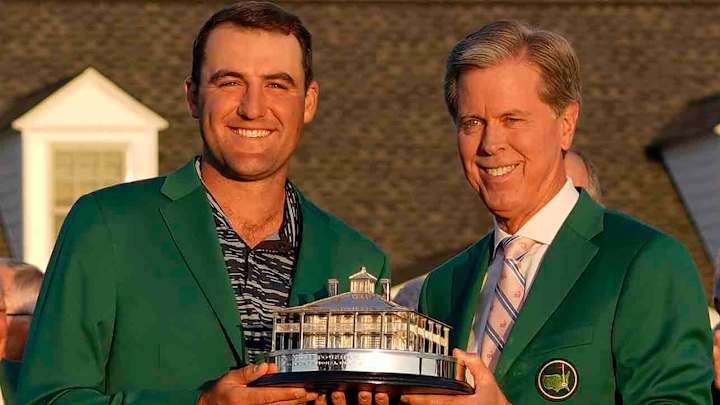Fred Ridley is Weathering a Storm Unlike Any Other Augusta National Chairman Has Faced

AUGUSTA, Ga. — Before Fred Ridley became the seventh Chairman of the Augusta National Golf Club in 2017, he was best known for his stellar achievements as an amateur golfer. In 1975, the 70-year-old University of Florida graduate was a Stetson law student when he beat Keith Fergus 2 up to win the U.S. Amateur at the Country Club of Virginia in Richmond.
Sports Illustrated’s Sarah Pileggi called Ridley the “best—or the luckiest—amateur golfer in the country, depending on how one feels about match play.”
At that ’75 U.S. Amateur most players complained about the match play format. Vinny Giles, who won the ’72 championship when it was determined by stroke play, said that he loved match play but didn’t think it should determine a national championship. Facing pressure to make the championship more appealing to a television audience, the USGA switched to stroke play in ’65, but reverted back to match play in ’73.
Opting for a career as a real estate lawyer over the PGA Tour, Ridley never turned pro, but he did play in three Masters. Now depending on where one stands on the current issues in the game—LIV vs. the PGA Tour and the rollback of the ball—Ridley could have the hardest job of any Augusta National chairman in the 87-year history of the Masters.
The Augusta National Chairman is one of the most powerful roles in sports. The chairman is a caretaker of a private and secretive organization that holds one of the biggest sporting events in the world. Clifford Roberts, who with Bobby Jones founded both Augusta National and the Masters, was the club’s first chairman. For much of the late '60s into the early '70s, Roberts was the face of the club’s confrontation with the Civil Rights movement that called for the club to invite its first African American to play in the tournament. By the time Lee Elder qualified to play in the ’75 Masters, Roberts had spent nearly a decade defending the club’s invitation qualifications against charges of racism.
In 1990, race became a central issue at the club again when an Augusta National member, Hall Thompson, made international news when he admitted to a newspaper reporter that Shoal Creek, a club he owned in Birmingham, Ala., didn’t accept Black members or allow members to bring Black guests. This admission, which came ahead of Shoal Creek hosting the 1990 PGA Championship, led to a widescale assessment of Black membership at elite private clubs.
As perhaps the most famous private club in America, Augusta National was thrust into the issue and its chairman, Hord Hardin, quickly had to respond to the crisis. In late 1990, the club quietly invited Ron Townsend, a Gannett television executive, to become its first Black member. The club didn’t issue a public announcement.
The culture wars continued with the Martha Burk crusade to bring women into the Augusta National membership. This time it was Hootie Johnson, who famously responded to Burk’s demands in a sharply worded three-page release from the club. "We will not be bullied, threatened or intimidated ... at the point of a bayonet," he wrote.
Instead of buckling to a burgeoning anti-Augusta National campaign led by Burk and her National Council of Women’s Organizations, Johnson dropped the Masters’ three sponsors—Citigroup, Coca-Cola and IBM—and made the 2003 tournament commercial-free. It would be another nine years before the club invited its first women members—former Secretary of State Condoleezza Rice and business executive Darla Moore.
Billy Payne was the chairman by the time the club opened its doors to women members. But he did have some controversy of his own during his 11-year term in the position. Most notably, he chastised Tiger Woods during the 2010 Masters for his extramarital affairs. Payne said that the 15-time major winner “disappointed all of us, and more importantly, our kids and our grandkids.”
As an accomplished amateur and past USGA president, Ridley is a traditionalist and a model of the Augusta National way. These traits make his job as the current chairman of the club, perhaps, the most difficult of any past chairman. The controversy over the LIV Tour and the rollback of the golf ball threaten to unsettle the game in ways unforeseen in the history of the Masters.
No Augusta National Chairman has ever had six of its champions defect to a rival tour that is suing an organization you’ve been in business with since the inception of your tournament. On Tuesday night, Ridley broke bread with these men during the Champions Dinner. The next day he had this to say about them.
“The platform that these players have built their careers on were based on the blood, sweat and tears of their predecessors, people like Ben Hogan, Arnold Palmer, Jack Nicklaus, Tom Watson, Tiger Woods,” he said.
Yet, like the five icons that Ridley mentions, those six defectors have lifetime exemptions into the Masters as past champions. He’s stuck with them and the divisive world of professional golf. Elder, Townsend, Rice and Moore wanted to belong to the traditions of the club when they accepted invitations to be there. But what happens when you have a civil war in the game? LIV Golf is dug in for a long fight with the PGA Tour and Ridley is in the unenviable position of having to take sides.
With ball bifurcation eminent in the game, Ridley has signaled that the Masters, as is its custom, will follow the dictates of the ruling governing bodies, USGA and R&A. This is an easy choice for the club, but it won’t make everyone happy, including many of the PGA Tour players who want to honor the tradition of all players using the same ball under the same rules, regardless of skill level.
Back when Ridley won the ’75 U.S. Amateur, he must have heard all the complaints from players about the switch back to match play, but he kept playing and beating his opponents. When his tenure is up as Augusta National Chairman, he will have lived through one of the worst storms in recent times in the game.
